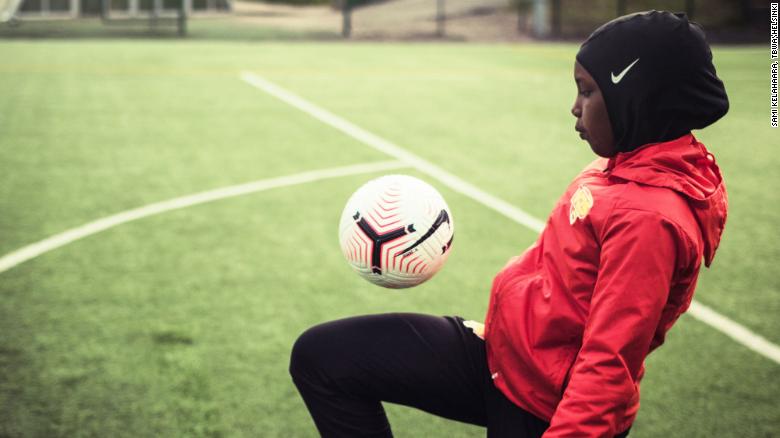By Ben Morse
(CNN) It's a country that takes the issue of equality seriously, and now the top division of women’s football in Finland — the National League — is to offer hijabs to any player that wants one.
When children start playing football in Finland, they are provided with kits, shorts, and socks by their teams but previously sport hijabs weren’t available. “Finland is known for being a country of equal opportunities,” Heidi Pihlaja, head of women’s football development from the Football Association of Finland,
said in a press release of the plan to make soccer uniforms “more hijabi appropriate.”. By donating hijabs we want to show our dedication to making football accessible to everyone,” added Pihlaja.
A player dribbles with a ball while wearing a Nike Pro hijab.”For us equality is about accepting everyone as they are regardless of their religious beliefs, color of their skin.
We hope that us leading by example encourages other sports and football associations to join us in promoting equality and equity in sports.
“According to a survey carried out by the Pew Research Center in 2018, almost two-thirds of Finns “revealed they believe Islam is fundamentally incompatible with the culture and values in Finland” while over a quarter indicated that they would not accept a Muslim as a family member, according to the governing body.
Last year, the football association removed the word “women” from the name of its highest women’s football league to challenge the “existing attitudes in sports.” In 2019, it also announced equal pay for both men and women players who compete for the Finnish national teams.
#HandsOffMyHijab
Elsewhere in Europe, the#HandsOffMyHijab movement organized by 16 year-old Mariem Chourak,
protested against the amendment to an ‘anti-separatism’ bill by French senators which applies to girls under 18 and is designed to strengthen France’s secular values.
In 2004, France banned religious garments including the Muslim hijab in state schools, and in 2010 banned full-face veils in public as well. Other countries have enacted similar rules; the United Nations has stated that the ban on full-face niqab could further marginalize Muslim women and is a violation of their human rights.
